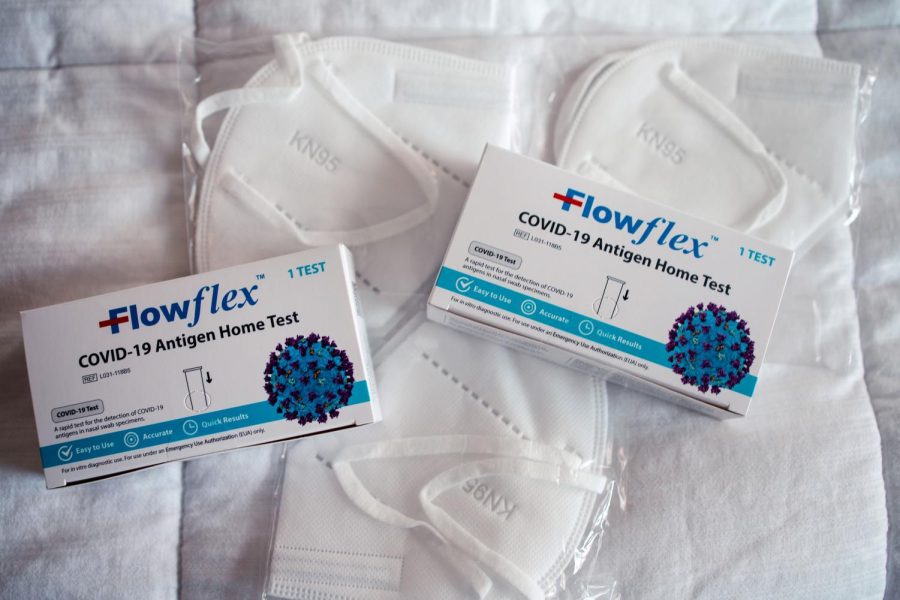Vaccine Clinics, Free Testing and Rising Cases
Flowflex COVID-19 antigen tests and KN95 masks.
COVID-19 cases have continued to rise around King County since masks and social distancing have become voluntary. 70 positive on campus cases were confirmed as of Saturday, May 28.
Tara Hicks, director of the Student Health Center at Seattle University, felt that an increased exposure among students contributed to the rising cases.
“There are many factors that have contributed to the rising cases of COVID-19 in Seattle/King County and on-campus including lifting of the state masking mandate and increase in activity of the BA.2 variant. On campus we had these two factors along with spring break which often involves travel and increased risk of exposure,” Hicks wrote to The Spectator.
Following the Center for Disease Control and Prevention’s (CDC) lifting of mask mandates and continuous rise in COVID-19 cases, booster vaccines shots and free at-home tests have been provided as safety precautions.
The Seattle U COVID-19 vaccination policy required students, faculty and staff to submit their up-to-date vaccination status by Friday, April 1. This decision was based on updated CDC guidelines that state an “up-to-date” vaccination consists of all the recommended COVID-19 vaccinations.
However, it can be hard for some students to receive their booster vaccinations, especially those who live out of state or international students.
Mario Atmadji, a fourth-year business analytics and finance major from Indonesia, expressed the challenges he faces finding available vaccine clinics.
“As an international student, it is just a matter of staying updated on the news for eligibility and finding the closest pharmacy to get the vaccine. Don’t wait to be vaccinated before it is too late,” Atmadji said.
Seattle U looked to help struggling students fulfill their vaccine requirements by providing on-campus COVID-19 vaccine clinics.
Seattle U partnered with Walmart Health Clinic so students could receive their Pfizer booster shot. The latest vaccine clinic this quarter was Thursday, May 26.
Jennifer Tuy, a third-year nursing student, explained that providing on-campus vaccinations encourages students and staff to get vaccinated.
“I got my booster shot at Seattle U and the process was quick. The people running the vaccine stands were encouraging people to get vaccinated even if they simply walked in. Keep in mind, I thought I had to make an appointment to get vaccinated and arrive at my exact appointment time,” Tuy said.
The federal government has also taken precautions, deciding to send additional testing kits to households that want them. The U.S Postal Service offered free rapid tests three times, a total of 16 tests available per household. Washington State also offers COVID-19 rapid tests through the Say Yes! COVID Test website.
Hicks found the at-home rapid testing convenient as she experienced quick results.
“By having quick access to testing, an educated decision can be made to improve the safety of gatherings, interactions with those at greater risk of severe disease and to identify if symptoms could be due to COVID-19,” Hicks said. “Also, there is treatment available for many people who are at higher risk of infection that needs to be started within five days of symptoms onset so the sooner they know they have COVID-19 the sooner they can access treatment.”
Tuy similarly discovered that having government at-home rapid tests is more cost-effective, especially to those who could not afford them.
“I am thankful that the government sends out COVID-19 tests because they can get expensive. I hope the government continues to send COVID-19 tests as cases remain to rise,” Tuy said.
Catherine Nguyen, a fourth-year biology major, also felt that the at-home test kits were a good resource for households needing more tests.
“I feel like the government did a good job in implementing these at-home tests. If they were to send more tests, I think it would be the most efficient and cost-effective policy to have a survey where households who would like more tests can request more,” Nguyen said.
COVID-19 is far from over despite the lifted restrictions. With the continuous increase in positive cases, the university hopes to keep providing resources and precautionary measures to protect the Seattle U community.


